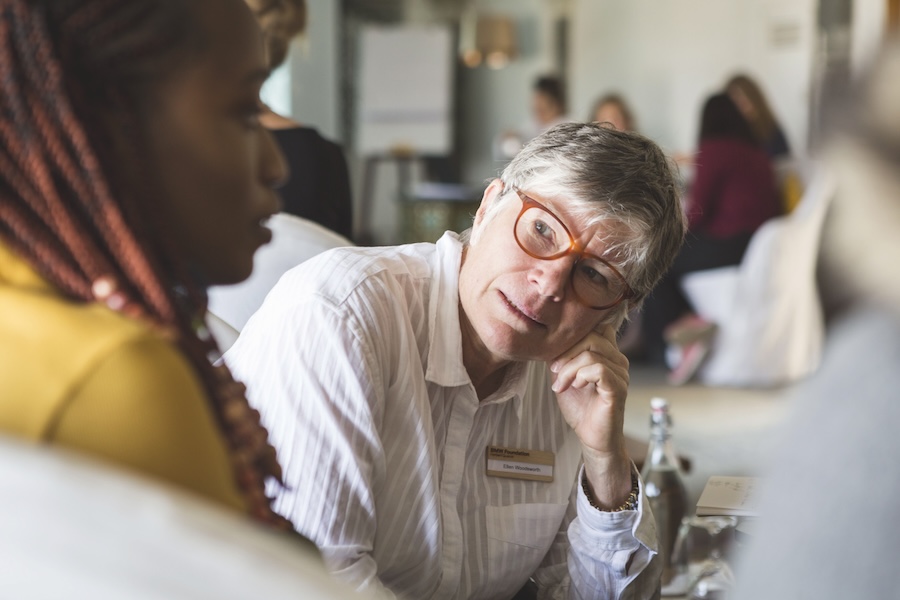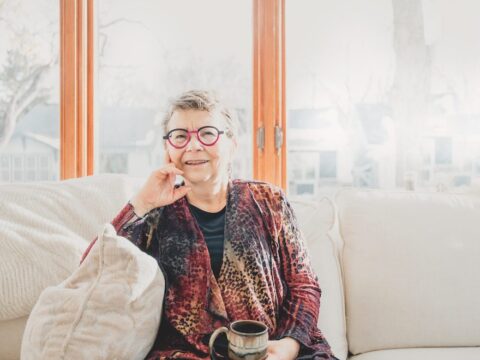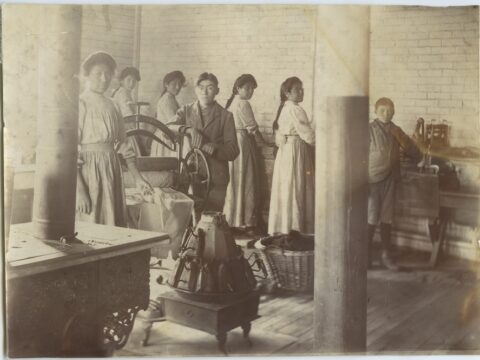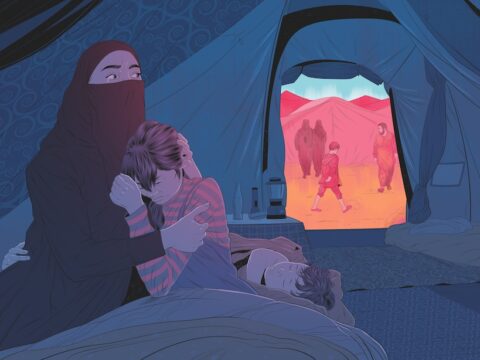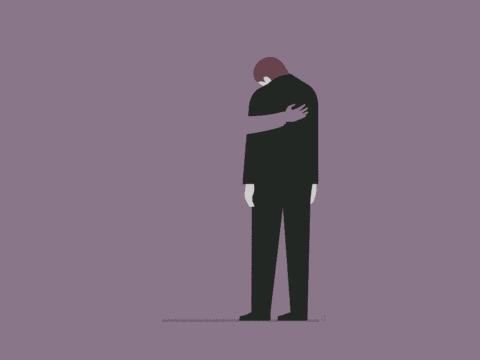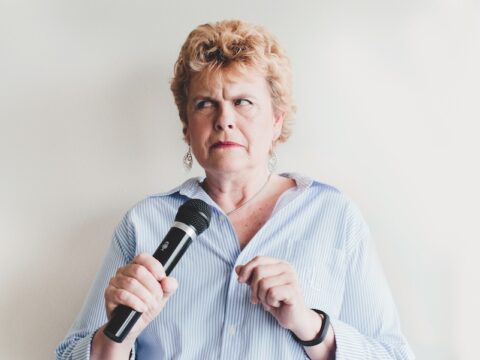Ellen Woodsworth has long been an advocate of the people. The activist and former Vancouver city councillor has travelled around the world to lead awareness campaigns and speak at peace conferences, advocating for the rights of women, seniors and 2SLGBTQ+ people. In 2002, she became Canada’s first out lesbian city councillor with her Vancouver election win and was re-elected six years later, focusing her efforts on housing and homelessness.
In the years since, Woodsworth has continued to make a difference on a local and international level. She’s the founder of Women Transforming Cities, an organization that promotes municipal engagement among marginalized people, and the co-president of the Women’s International League for Peace and Freedom Canada, a group calling for disarmament. From her home in Vancouver, she spoke to Tobin Ng about the past, present and future of feminism.
TOBIN NG: Let’s start at the beginning: what impact did your parents have on your activism?
ELLEN WOODSWORTH: My father was born and raised in Japan and later became the national chair of the Canadian Campaign for Nuclear Disarmament, where he worked on peace issues. In 1965, just after I turned 17, he took me to China. It was the era of Chinese politician Mao Zedong, who famously said, “Women hold up half the sky.” The Cultural Revolution was launched in 1966.
When it came to the feminist movement, women there were so far ahead of any other country: there were childcare centres and dining halls everywhere, so they weren’t stuck at home cooking and cleaning and instead were engaged in all aspects of society.
No other world leader or even local leader was similarly creating ways for women to be equal.
My mom, on the other hand, grew up on a farm, but was very involved in social justice issues in Toronto — especially ones that dealt with women’s liberation. She read extensively, was always going to marches and was on the first board of the National Action Committee on the Status of Women.
More on Broadview:
TN: You were involved in the 1970 Abortion Caravan to Ottawa, which helped spur Canada’s decriminalization of abortion 18 years later. What was it like to be part of that protest movement?
EW: The Vancouver Women’s Caucus wanted to focus on an issue that would bring all kinds of different women together. We agreed that health care — specifically, a women’s right to choose — was so pressing. You couldn’t even easily get birth control in those days. Meanwhile, Indigenous women were being sterilized, and there were graveyards full of people who died because of illegal abortions.
A group of us travelled from Vancouver to Ottawa in several vehicles, including a Volkswagen van with a black coffin strapped to its top. We mobilized hundreds of people to march on Parliament Hill and demand a meeting with then Prime Minister Pierre Trudeau.
Only a few MPs agreed to meet with us, so we came up with a new plan. The next day, a group of us walked into the gallery in the House of Commons and quietly chained ourselves to our chairs. Then we started yelling: “Women’s right to choose! Thousands of women are dying!” The men on the House floor were livid.
TN: Did participating in that initiative change you?
EW: It was very empowering, and it showed me a new kind of leadership. We were able to organize with such a broad base of people from different areas and political backgrounds. It was a great example of how you can have little money but still bring people together to create change. What we built with the abortion caravan gave me the strength to come out as a lesbian.
TN: You spent a decade working on issues of housing and homelessness in Vancouver’s Downtown Eastside. How did that experience shape your advocacy?
EW: The situation at the time was grim: cocaine was just hitting the scene, Indigenous women and girls were going missing and being murdered, and there were a lot of seniors in the Downtown Eastside without places to live. No one was paying attention.
For 27 years, women at the Downtown Eastside Women’s Centre had been dreaming of creating housing by and for their community. So I did a bit of organizing and was able to secure some money and city land to build Bridge Housing. The Downtown Eastside Women’s Centre moved into the basement and the main floor, and the rest was used for housing.
Then people started asking me to run for city council. At first, I said no because Bridge was too important. But then I was approached by one of the volunteers on Bridge’s organizing team, a woman who lived in the Downtown Eastside. “You have to be there for us,” she said. That’s when I decided I’d run, and in 2002 I was elected. I wanted to use my position on council to design an ideal city for women and girls, so I worked with staff to create the first gender equality strategy for a city in Canada.
When I lost the next election, I was devastated. But I didn’t give up.
TN: What difference can women and queer politicians make at a municipal level?
EW: The majority of people in Canada live in cities. It’s where capital accumulates and where some of the most oppressive institutions are based.
Just look at Vancouver, where people can’t afford rent, and vulnerable communities — including Indigenous people, trans folks and sex workers — end up on the streets.
While inner cities may be the epitome of what society’s biggest issues are, they’re also where the resistance is. They’re places where it’s possible for activists to get enough support from the community to get elected, and for them to bring in enough of a majority to make change. At the provincial and federal levels, you have to build that coalition within your party.
TN: How has Women Transforming Cities supported municipal issues?
EW: We’ve done everything from training people to speak out at council meetings, to bringing people together in coffee shops and teaching them how to raise their issues, to encouraging women to run for leadership positions, to connecting with other municipal organizations across Canada and around the world.
TN: How has intersectionality informed your activism?
EW: Just after I came up with the idea of Women Transforming Cities, a friend took me to hear Kimberlé Crenshaw, an American civil rights advocate and critical race theory scholar, speak. After, I realized intersectionality has to apply to everything. You can’t decolonize and not see the intersections of racism, Indigeneity, queer issues. That’s why I think movements need to see the complexity of intersectionality, both globally and locally.
TN: What about the work to be done beyond the municipal level?
EW: When I became co-president of the Women’s International League for Peace and Freedom, Canada, I started to focus more on how to decolonize, demilitarize and decarbonize — all issues that we need to start tying together. In 2023, an estimated 1.38 percent of Canada’s GDP went to defence. That same year, NATO spent an estimated US$1.26 trillion on militaries — money that could have gone to fight climate change.
Change needs to happen at all levels of government if we want to survive.
TN: Your work involves combatting heavy, structural issues. What drives you to keep going?
EW: My parents provided me with a philosophical outlook on life. My mother kept being an activist until she died. My father continued with Veterans Against Nuclear Arms and went on peace marches until he died.
I think you have to balance your energy and do things that bring you joy. I practise tai chi. My partner and I kayak and snowshoe. We read books and don’t own a TV.
TN: What are you working on next?
EW: I’m organizing an On to Ottawa peace caravan that will leave Vancouver on Mother’s Day. I’m hoping to make the links between the defence budget, climate change and the inaction on truth and reconciliation.
We’ll make stops along the way to ask people what the issues in their communities are. The caravan takes after a long tradition of being on the west coast and feeling like we’re really far from Ottawa.
Everyone is worried about war and climate change. For those of us who can, we have to speak out.
This interview has been edited for length and clarity.
This story first appeared in Broadview’s June 2024 issue with the title “A Champion of Change.”
***
Tobin Ng is an associate editor at Maisonneuve Magazine. They live in Ottawa.

